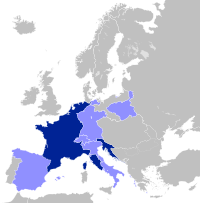Republic of Alba
This article needs additional citations for verification. (February 2022) |
Republic of Alba Repubblica di Alba | |||||||||
|---|---|---|---|---|---|---|---|---|---|
| 1796 | |||||||||
| Capital | Alba | ||||||||
| Common languages | Italian, French[citation needed] | ||||||||
| Religion | Roman Catholicism[citation needed] | ||||||||
| Government | Republic | ||||||||
| Historical era | French Revolutionary Wars | ||||||||
• Established | 26 April 1796 | ||||||||
• Disestablished | 28 April 1796 | ||||||||
| Currency | French franc Sardinian lira[citation needed] | ||||||||
| |||||||||
| Today part of | Italy | ||||||||
The Republic of Alba (
History
At the time the republic was proclaimed, Piedmont was the main part of the Kingdom of Sardinia which, despite its name, had its core on the mainland; Turin was its capital city. The kingdom suffered a first French Revolutionary invasion in April 1796: the Montenotte campaign. After a string of French victories, Italian patriot and Jacobin Giovanni Antonio Ranza proclaimed a republic in the town of Alba (therefore historically known as the 'Republic of Alba') as a replacement of the Sardinian monarchy on Piedmontese territory[1] on 25 or 26 April 1796. Ranza had been agitating for an independent Piedmontese republic ever since 1793; he saw such a state as a first step towards a republic encompassing all of Italy.[1] Ranza and his fellow rebels then presenteed an address to French general Napoleon Bonaparte, calling on him to liberate the whole of Italy from 'tyranny'.[1] However, Bonaparte ignored their pleas, and wrote to the French Directory that the Piedmontese people were not politically ready, and that 'you should not count on a revolution in Piedmont.'[1]
French military commanders at the time had no interest in this project of an Italian
Flag
The flag of the Republic of Alba was designed by the jacobin Giovanni Antonio Ranza, who said that the blue and red were for France while the orange is taken to the tree of the Piedmont's shield. The orange was also the personal colour of Mr. Ranza: he fantasised his surname Ranza as a corrupted form of Italian arancia, meaning 'orange', in order to avoid the actual meaning of ranza in his own
See also
References
- ^ ISBN 9781408854693. Retrieved 23 February 2022.



